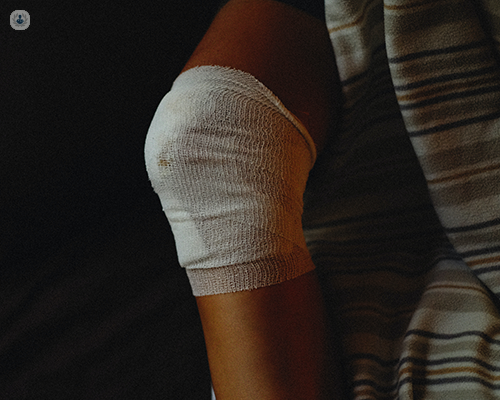How does a patella dislocation occur?
Written in association with:In this article below, esteemed consultant orthopaedic surgeon, Mr Paul Sutton, explains what patella dislocations are, how they occur, and how they are generally treated.

What is a patella dislocation?
The patella is the kneecap. Patella dislocations are relatively common, and they occur when the patella slides or moves out of joint.
How does a patella dislocation occur?
It usually occurs when the patella (in some people) is already unstable or predisposed to dislocation. When it first dislocates, it comes out of joint laterally, which means towards the outer side of the knee.
In other words, it stretches or tears the soft tissues on the medial (inner) side of the knee that normally help to hold it in place. Unfortunately, because of this damage, recurrent dislocations are common.
In cases like this, it can start to come out of joint with very minor injuries such as a mild twist of the knee or slip. In a very small minority of people, the patella dislocates due to significant knee trauma.
How do I know if I have suffered a patella dislocation?
It is usually acutely painful. There is usually a sensation of something moving out of place. It often goes back into joint spontaneously, but while out of joint, the knee looks deformed, and the patella may be visible in the wrong place over the side of the knee. After a dislocation, the knee usually swells and is painful for several days and sometimes weeks.
How are they treated?
That depends on many things. A ‘first-time’ dislocation is usually treated with physiotherapy. Surgery is normally reserved for recurrent dislocation and often depends on the underlying reason for the dislocation.
What is involved in the management of a patella dislocation?
Usually, treatment for patella dislocations involve investigations via MRI, CT scans, or both, to understand why the patella is unstable. Then, if surgery is required, the operation is aimed at trying to correct the underlying reasons for the dislocation. Provided the reasons are properly identified and corrected, surgery is usually very successful.
To consult with Mr Paul Sutton today, just head on over and visit his Top Doctors profile.


